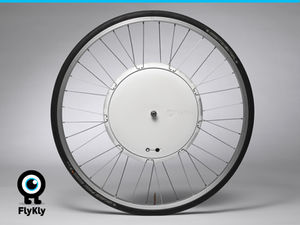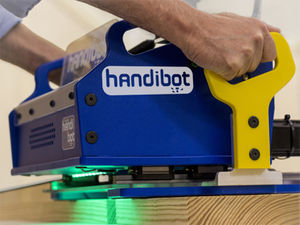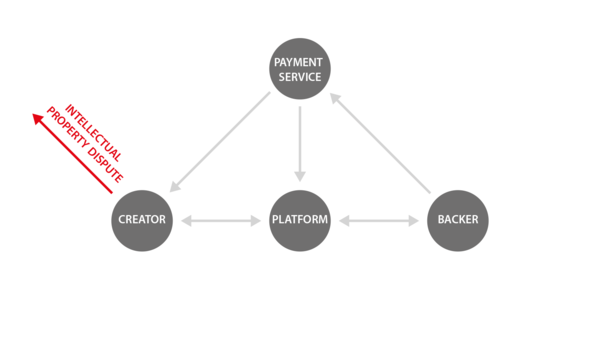Difference between revisions of "Intellectual Property Disputes"
Wikidoctor (Talk | contribs) |
Wikidoctor (Talk | contribs) |
||
| Line 1: | Line 1: | ||
| + | __TOC__ | ||
The following article deals with intellectual property disputes in crowdfunding. See the main article for an overview of the [[Disputes in Crowdfunding]]. | The following article deals with intellectual property disputes in crowdfunding. See the main article for an overview of the [[Disputes in Crowdfunding]]. | ||
Latest revision as of 13:17, 21 May 2015
Contents
[hide]The following article deals with intellectual property disputes in crowdfunding. See the main article for an overview of the Disputes in Crowdfunding.
Intellectual property can best be described as "creations of mind", for example visual art, design, inventions, literature. Intellectual property can be protected by law with patents, copyrights or trademarks, which help the creators to secure their ideas from being used or stolen by somebody else.
Most crowdfunding platforms protect themselves by not taking any responsibility if projects posted on their site get stolen. Some of them do, however, take action if they are informed that one of the projects which is currently in the process of collecting funds is using somebody else's intellectual property. In the case of Kickstarter, they "freeze" the campaign for a period of 30 days to resolve the dispute. If the problem is taken care of, they then re-post the project, otherwise it is cancelled. They inform the backers that the project they are financing is removed for the time being with an email, such as this one:
- ”Hi there,
- This is a message from Kickstarter Support. We're writing to inform you that a project you backed, GameStick: The Most Portable TV Games Console Ever Created, is the subject of an intellectual property dispute.
- The law requires that we remove the project from public view until the process is complete or the dispute is resolved. If we are not able to re-post it within 30 days, we will cancel the project, all pledge authorizations will expire, and the project will be permanently unavailable.
- If you'd like to manage your pledge, you can do so through the project page:
- http://www.kickstarter.com/projects/872297630/gamestick-the-most-portable-tv-games-console-ever?ref=email
- If you have any questions, we encourage you to message the creator directly. You can also do this from the project page.
- Thanks so much for your patience and cooperation,
- Kickstarter” [1]
Presentation Disputes
The first kind of intellectual property disputes regarding crowdfunding are presentation disputes. They occur, when project creators use somebody else's intellectual property as material for their own presentation. In most cases these disputes care quickly resolved, if the creators remove the controversial material from their presentation or if they gain permits from the owners.
GameStick

As an example for presentation disputes, GameStick is a video game console developed by PlayJam. The project was launched to Kickstarter in 2013 with the aim of collecting $100,000. Sometime during the campaign Kickstarter pulled their project off the site due to an "intellectual property dispute". It turned out, that the campaign presentational video included some footage of a video game, for which they did not have the proper rights. They removed the problematic content, re-edited their video and were put back up on Kickstarter. They successfully finished their campaign, receiving almost $650,000. [3] [4] [5]
Idea Theft
On various occasions crowdfunded projects find themselves in the middle of intellectual property theft discussions, but unless the products are patented or otherwise protected, it is very hard to come to a fair conclusion. Many of such disputes are never resolved and most of them are discussed privately between project creators.
Flykly Smart Wheel & The Copenhagen wheel

This is an example for idea theft. In late 2009 the SENSEable City Lab (MIT) developed the technology of the Copenhagen Wheel, but it was not available for sale right away. Then in October 2013, a very similar technology was launched as a Kickstarter campaign, called the FlyKly Smart Wheel. At the same time as FlyKly's campaign, a new company, Superpedestrian, announced their funding to produce the MIT's Copenhagen Wheel, but no details or timelines were revealed. The FlyKly Kickstarter campaign was successful and soon after that, Superpedestrian began accepting pre-orders for the Copenhagen Wheel.
When the representatives of the projects were asked about the similarities, Biderman, the lead behind Superpedestrian, stated “I don’t know if these guys at FlyKly are infringing on our patents because I haven’t looked inside. But from the outside it looks a bit similar. […] Their founder actually dropped by our lab at MIT a year and a half ago, saying he wants to collaborate, and spent quite some time with the Copenhagen wheel team. We’ll leave it at that.” Niko Klansek, the founder of FlyKly doesn't deny his visits and tweeted: "No patent overlap with the CW. The idea of a "smart wheel" has been around for 20 years and is not patentable in and of itself." [7]
Identity Theft
After a project is presented on one of the crowdfunding platforms it sometimes happens, that after some time the same project campaign (same name, same presentation and material) is posted again by somebody else on a different crowdfunding site, who is collecting funds off of somebody else's idea. This is known to have happened various times over the platform Indiegogo, due to their "flexible funding" system, which enables imposers to copy a campaign and collect funds as soon as they are donated by backers. They try to get as much money as possible before their fraud is uncovered. Most of the crowdfunding sites do not release the funds until after a campaign is successfully completed.
The ShopBot Handibot, Pirate 3D, Hinges, Like a Virus...

In this case of identity theft, a Kickstarter campaign for the ShopBot Handibot, a new "smart" digital power tool, was going well over their initial goal of $125,000, when the owner of ShopBot discovered, that a nearly identical Handibot campaign was running on Indiegogo, with text and graphical material copied directly from their Kickstarter project website - only the funds were going to a different account. The same happened with various other Kickstarter campaigns, e.g. Pirate3D, Hinges, Like a Virus. All four Indiegogo sites were cancelled and removed as soon as the real creators notified the service. [9]
Reselling
Sometimes a creator takes and existing item from the online market (for example from E-Bay or Amazon), rebrands it and promotes it on a crowdfunding platform as their own work. The item is usually promised as a reward for backers who donate a certain amount of money, which vastly exceeds the actual price of the item. The creator actually buys the product off an online shop and then offers it as reward for double or triple the money its worth.
Free Roll Machined Player Dice

This is an example for reselling. A man started a Kickstarter campaign for a set of aluminum RPG game dice, which he advertised as his own design. Backers who donated at least $30.00 would get a set of these dice as a reward. The campaign was with $5,000 well above the asking goal of $1,500 with only a few more days to go, when somebody found the exact same item being sold on Amazon online shop, only that the entire set was worth only about $12.00. The creator then cancelled the campaign himself and never collected the funds. [11] [12] [13]
References
- Jump up ↑ GameStick Pulled From Kickstarter Due to Intellectual Property Dispute (Updated) Downloaded on Dec. 5, 2014
- Jump up ↑ GameStick: The Most Portable TV Games Console Ever Created Downloaded on Dec. 5, 2014
- Jump up ↑ GameStick: The Most Portable TV Games Console Ever Created Downloaded on Dec. 1, 2014
- Jump up ↑ GameStick pulled from Kickstarter citing 'intellectual property dispute' Downloaded on Dec. 1, 2014
- Jump up ↑ Kickstarter's growing problem with intellectual property Downloaded on Dec. 1, 2014
- Jump up ↑ FlyKly Smart Wheel Downloaded on Dec. 5, 2014
- Jump up ↑ Reinventing The Wheel. The Smart Wheel vs. The Copenhagen Wheel (Part 1/3) Downloaded on Dec. 5, 2014
- Jump up ↑ Handibot™: A Smart Digital Power Tool Downloaded on Dec. 5, 2014
- Jump up ↑ Crowdfunding Confusion: Scammers Attempt to Rip Off Successful Campaigns Using Indiegogo Downloaded on Dec. 1, 2014
- Jump up ↑ Free Roll Machined Gamers Dice (Canceled) Downloaded on Dec. 5, 2014
- Jump up ↑ Free Roll Machined Gamers Dice (Canceled) Downloaded on Dec. 1, 2014
- Jump up ↑ Aluminum Dice 5 in 1 Set Travel Case Deluxe Gift Souvenir Downloaded on Dec. 1, 2014
- Jump up ↑ Free Roll Machined Gamers Dice Turns Out to Be Kickstarter Scam Downloaded on Dec. 1, 2014
